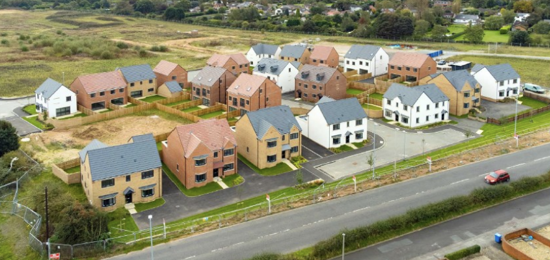The need for speed
Many developers rightly regard the sale of the homes they’ve built as their scheme’s crowning achievement.
It’s more than just the moment they achieve their return on investment; it’s also the ultimate realisation of their vision.
But as recessionary clouds begin to gather, selling homes is taking longer. New research shows that in the six months to July, the average time taken to complete a sale was 153 days – more than five months – compared to the average of 124 days taken before the pandemic.
In large part this is due to bottlenecks among conveyancing solicitors, who have been swamped with demand for their services during the post-pandemic property boom. In recent months the gradually slowing property market may also have made it take longer to agree a sale in the first place.
Those developing new-build homes can speed the process by proactively planning their sales strategy and making sales an integral part of the development schedule. Here are the five key steps developers should take to ensure sales are achieved as quickly and successfully as possible.
Get the sales schedule right:
Once building work begins, developers can become so focused on dealing with construction issues that they put their sales plan on the back burner.
But failing to sort your sales strategy until the start of the sales period is a mistake. Engage an estate agent early to help you plan, and remember that it pays to start warming up potential buyers early – for example by creating a simple website for the scheme with CGIs and details of your plans, and by posting time-lapse videos of the construction on social media.
Equally you should think carefully about how long the sales period will need to be, and how you can limit the risk of construction overruns eating into it. Stress-test your build schedule for several delay scenarios, to ensure you are left with sufficient time to achieve the sales targets you’ve set.
Showtime:
Complete at least one show home early. Most people find it hard to visit a muddy building site and envisage what the completed units will look like, and showing prospective buyers around too soon risks putting them off.
Whereas it was once common for SME developers to leave just a couple of months between the completion of the first home and the rest of the scheme, in the current market this is unlikely to suffice. To have a serious chance of selling off-plan, you will need to be able to show buyers around a show home well ahead of practical completion.
Don’t go too far the other way either, and avoid the temptation of finishing the development fully before marketing it. Some developers insist that for properties to sell at the highest price, they need to be totally completed and dressed. While this may be true in some cases, the additional interest costs incurred may wipe out any price premium achieved.
Get on the legal front foot:
Registering legal titles currently takes longer than usual, so this process should be started early. Developers need to think right at the start not just how to cut up plots, but also about what each buyer’s deeds will comprise, how any communal areas will be delineated and managed, and so on.
In practice this may mean engaging your solicitor earlier than envisaged, but this expense could yield dividends if it speeds the sale process. Estate agents like to know this sort of detail so they can answer queries from prospective buyers, so ensure your agent is briefed accordingly.
The best way to speed up the conveyancing process is to ask your lawyer to pre-empt what buyers’ solicitors will ask. This is likely to involve the creation of buyer packs, which will include answers to all standard legal queries.
Needless to say, developers should also deal promptly with any outstanding planning or building regs issues to ensure they don’t become banana skins for sales.
Listen to and motivate your estate agent:
Nurturing the relationship with your estate agent is crucial. Their expertise is often invaluable, as they will know the intricacies of the local property market and will be able to help you choose the right pricing and sales strategy to get the right buyers through the door.
You should ask the agent to take an active role in your marketing strategy, and request a detailed plan from them that sets out how and when they will sell off-plan.
While the commission model means your interests are aligned when it comes to achieving the best possible price for each unit sold, it may also be worth linking the agent’s fee to the speed of the sale to ensure things don’t drag on unnecessarily.
Lean into your lender:
When agreeing your development finance at the start of a scheme, be realistic about the repayment period you will need. The loan term should include a sufficient period for the marketing and sale of the properties you’re building, plus a sensible margin to cover unexpected delays.
Once construction begins, try not to lose sight of the sales period and its importance. Keep one eye on market conditions and keep asking yourself if the sales period you’ve allowed will be sufficient.
As you draw down on your facility, keep talking to your lender. If construction runs slow and the project schedule begins eating into its safety buffer, the sooner you flag these issues to your lender, the better.
It may be possible to negotiate an extension to your existing facility, or refinance out once the original term is complete, but you’re likely to have more options the earlier you discuss them.
Supply chain issues mean that some delays in construction may be unavoidable. But several of the issues most commonly responsible for holding up the sales process can be avoided.
Such delays cost developers money, both in terms of the opportunity cost of unsold assets as well as extra interest and fees incurred on their finance.
At Atelier we pride ourselves on the strength of the partnerships we form with developers, and on our ability to provide more than just finance.
That’s why our in-house team of surveyors and finance experts work with all our borrowers throughout the drawdown process, providing support and guidance to ensure both the construction and sale of their scheme go smoothly.
We’re committed to helping property professionals realise development opportunities, supporting their vision right from the design and build phases through to a successful sale.


